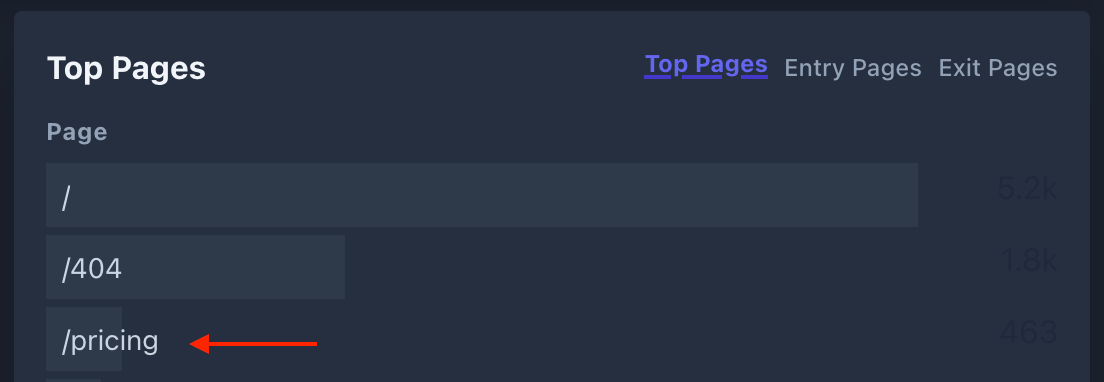How Pxl’s SaaS Pricing Strategy is Evolving

Lately, I have been thinking a lot about pricing strategies for Pxl, the first acquisition in the Waterglass portfolio I made earlier this year.
Throughout the last 1.5 years, a few pricing experiments have been conducted by the previous owner, mostly around custom packages and lifetime deals. These experiments serve as a basis for further refinement of Pxl's pricing.
Getting pricing right is key in building a differentiator in an established industry, especially for marketing tools like Pxl that offer marketers the ability to create short links, QR codes, and microsites (link-in-bio pages).

Lately, growth for SaaS businesses, in general, has been hard to come by, and I think a well-planned pricing strategy can help adapt to this new situation.

When comparing the current pricing plans above to the industry leader's plans below, it's clear that I want to remain Pxl competitive.
But the question is, does Pxl's competitiveness come from being cheaper or offering more features–or by coming up with a completely new pricing strategy altogether that better aligns with how customers perceive value from using the product?

Pricing strategies I'm thinking about
Below are 3 pricing strategies that I'm currently exploring for Pxl.
1) Lifetime deals
Long gone are the days when you would pay for software once and use it almost forever, but lifetime deals remain high on the list of preferred pricing models for many customers.
However, since Amazon didn't become one of the most valuable companies in the world by renting out their servers for free, lifetime deals don't make much sense for SaaS businesses as they lead to margin compression quickly.
But that doesn't mean lifetime deals can't be useful. Especially for bootstrapped founders, such deals can be a great funding model. You get cash in from early customers and use that cash to pay for product development.
But that's precisely the point: it's a funding model, not a pricing model. Nevertheless, I like the idea nonetheless.
By the way, Jason Fried, CEO of 37 signals, the company behind Basecamp and Hey.com, also started a new offering called ONCE. At its core, you pay for their software once and run it on your own infrastructure. No subscriptions. No fees.
Further thoughts
What about a Pxl lifetime deal with updates and new features for a limited time, say one year, to incentivize annual renewals?
2) Subscription paired with usage-based pricing
Another direction I'm exploring is offering a low-priced Pxl subscription that acts as an entry point. Customers could then extend their experience by adding usage-based add-ons.
For example:
| Base plan ($5 / mo.) | Add-ons ($10 / mo. each) |
|---|---|
| 50 short links | 100 short links |
| 10 QR codes | 50 QR codes |
| 5 Microsites | 10 Microsites |
| 5 Workspaces | |
| Analytics | |
| API access |
In theory, this should make the purchase decision for Pxl easy and clear the biggest hurdle, getting the customer's initial payment.
It also aligns well with value creation, as frequent users pay more for the value they receive. The downside, however, is that the next month's billing cycle can become somewhat unpredictable.
Another negative aspect to avoid is making pricing too complex. It's essential to ensure that users do not have to think too much about it under any circumstances.
Signing up for a Pxl plan should be as straightforward as paying €3.70 for a flat white with oat milk at my favorite barista in Berlin (you know who you are!)
Further thoughts
Could this hybrid model be paired with an incentive to spread the word about Pxl, such as offering a free add-on if someone signs up through a referral link?
3) Fully modular pricing
Modular pricing is similar to the previous hybrid model, but it takes it even further.
What if you could build Pxl just the way you want it? Compared to traditional SaaS, this would be a totally different approach, allowing each customer to fully customize their experience and how much they are willing to pay for it.
This could be achieved through a modular pricing strategy that includes a certain number of modules in each tier.
For example:
- $15 / mo. for 3 modules
- $25 / mo. for 5 modules
- $45 / mo. for 10 modules
Modules in different sizes could then include:
- Short links
- QR codes
- Microsites
- Workspaces
- Analytics
- API access
- ...and much more
The future of pricing, I'm convinced, lies in customization. If you take a step back and look at the broader picture, I believe AI will enable fully personalized experiences tailored to each user, and this customization will extend beyond pricing.
Further thoughts
What if a customer starts using Pxl the way they want by simply adding a credit card, and after 2-4 weeks of continued usage, Pxl makes a tailored offer—fully customized and fully automated?
What about a free plan?
I haven't made up my mind about free plans yet, although generally speaking, I'm not a big fan of them. Yet, to be honest, the definitive answer needs to be more nuanced.
Most of Pxl's competitors offer a free plan, so I'm inclined to do the same. One positive aspect of free plans is that, if done right, free users promote the product by using it. through i.e. branded assets.

Viewed through this lens, free plans can offer a significant benefit, but they should be considered a marketing strategy rather than a pricing strategy.
While there are still plenty of other pricing strategies, such as transactional and pay-as-you-go, I’m not considering them for Pxl at this point.
What is clear though is that I want to try something new with Pxl's pricing that closely aligns with the value customers get from using the product.
Ideally, this approach will also make people talk about it, as pricing can and should be part of a branding strategy, too.